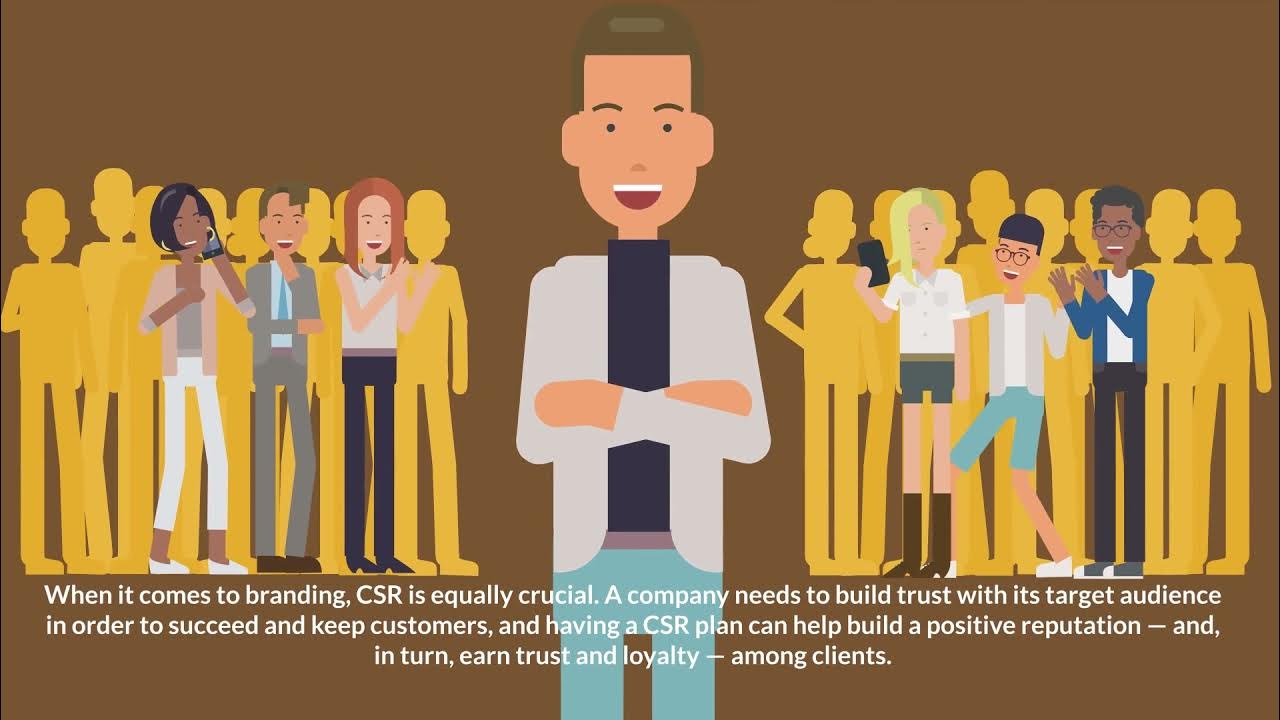CSR: What is Corporate Social Responsibility? Definition Examples Benefits
Summary
TLDRIn this video, Alex discusses the importance of Corporate Social Responsibility (CSR) for businesses, highlighting how companies like IKEA, Starbucks, and Patagonia manage their socio-environmental impacts. The video delves into how CSR can lead to increased profits, improved brand image, and better working conditions, while also scrutinizing which companies are genuinely committed to sustainability and which may be greenwashing. Alex also emphasizes the importance of consumer awareness and introduces the concept of B-Corp certification as a standard for ethical business practices.
Takeaways
- 📈 Corporations focus on making money but also need to take responsibility for their socio-environmental impacts.
- 🌍 Corporate Social Responsibility (CSR) helps companies capture opportunities and avoid risks while promoting sustainability.
- 🏢 Examples of CSR in action include IKEA, Starbucks, and Patagonia, with varying levels of commitment and impact.
- 📊 CSR practices include ethical sourcing, compliance with regulations, charitable donations, and improving working conditions.
- 💡 Embedding CSR into a company’s DNA can significantly increase profitability, with benefits like increased market share and reduced costs.
- 🛠 Starbucks claims 98.6% ethical sourcing but faces criticism for its environmental impact, like disposable cup waste.
- 🔍 Patagonia is more transparent about its environmental impact, using recycled materials and organic cotton while engaging customers in sustainable practices.
- 👀 Evaluating a company's CSR efforts requires looking at both how they make and spend their profit, focusing on their environmental and social impacts.
- 🏅 B-Corp certification is a private certification recognizing companies for their social and environmental performance.
- 🎯 Companies that genuinely prioritize people and the planet tend to succeed by building strong goodwill and trust in the marketplace.
Q & A
What is Corporate Social Responsibility (CSR) as described in the video?
-Corporate Social Responsibility (CSR) is the concept where businesses take responsibility for their socio-environmental impacts. It includes self-regulated initiatives like philanthropy, compliance with environmental regulations, ethical business practices, and efforts to improve working conditions and reduce carbon footprints.
Why is CSR important for corporations according to the video?
-CSR is important because it helps corporations capture opportunities and avoid risks, improves their market share, reduces operational costs, increases employee productivity, and enhances brand image. Companies that integrate CSR into their operations can see significant profit increases.
How does the video suggest consumers can differentiate between companies that are genuinely committed to CSR and those that are 'faking it'?
-Consumers can differentiate by analyzing how companies make and spend their profits. They should look at the environmental and social impacts of a company’s products and services, how they treat their employees and suppliers, and whether their profits are reinvested in sustainable practices or simply used to increase shareholder wealth.
What are some of the socio-environmental issues IKEA has been involved in according to the video?
-IKEA has been involved in issues related to waste management, dangerous chemical use, child labor, poor working conditions in factories, and unsustainable wood procurement.
What role do millennials play in the importance of CSR for companies?
-Millennials play a significant role in CSR's importance because many of them consider a company's commitment to social and environmental issues when deciding where to work. Additionally, a substantial percentage would accept a lower salary to work for a company that aligns with their values.
How does Starbucks approach CSR according to the video?
-Starbucks claims that 98.6% of its coffee is ethically sourced, has trained 200,000 farmers, and invested in farmer loans and emergency relief funds. However, the company faces criticism for its environmental impact, such as contributing to landfill waste through disposable cups.
What makes Patagonia’s approach to CSR stand out in the video?
-Patagonia stands out because it acknowledges the environmental impact of its products, uses recycled fibers for 64% of its materials, grows 100% of its cotton organically, and ensures that 82% of its products are Fair Trade certified. The company also promotes consumer responsibility by encouraging customers to buy less and demand more sustainable products.
What is B-Corp certification, and how is it relevant to CSR?
-B-Corp certification is a private certification for companies that meet high standards of social and environmental performance, accountability, and transparency. It is relevant to CSR because it provides a credible measure of a company’s commitment to positive social and environmental practices.
How can CSR impact a company's profitability according to the research mentioned in the video?
-Research by Bob Willard suggests that embedding CSR in a company’s operations can significantly increase profitability, ranging from a 51% increase for small and medium businesses to an 81% increase for large corporations. This is achieved through improved market share, reduced costs, and enhanced productivity.
What are the main benefits of integrating CSR into a company's business model as described in the video?
-The main benefits include increased revenue and market share, reduced energy and material expenses, enhanced productivity, lower employee turnover, reduced risks related to brand image and compliance, and overall improved financial performance.
Outlines

This section is available to paid users only. Please upgrade to access this part.
Upgrade NowMindmap

This section is available to paid users only. Please upgrade to access this part.
Upgrade NowKeywords

This section is available to paid users only. Please upgrade to access this part.
Upgrade NowHighlights

This section is available to paid users only. Please upgrade to access this part.
Upgrade NowTranscripts

This section is available to paid users only. Please upgrade to access this part.
Upgrade NowBrowse More Related Video

RSE: Responsabilité Sociétale des Entreprises - Définition Exemples Avantages

Coporate Social Responsibility & Sustainability | International Business | From A Business Professor

How Does Corporate Social Responsibility CSR Affect Your Business

Landasan Hukum CSR di Indonesia dan Dinamikanya

SROI: Mengelola dan Mengukur Dampak CSR

Corporate Social Responsibility Examples: CSR in marketing
5.0 / 5 (0 votes)